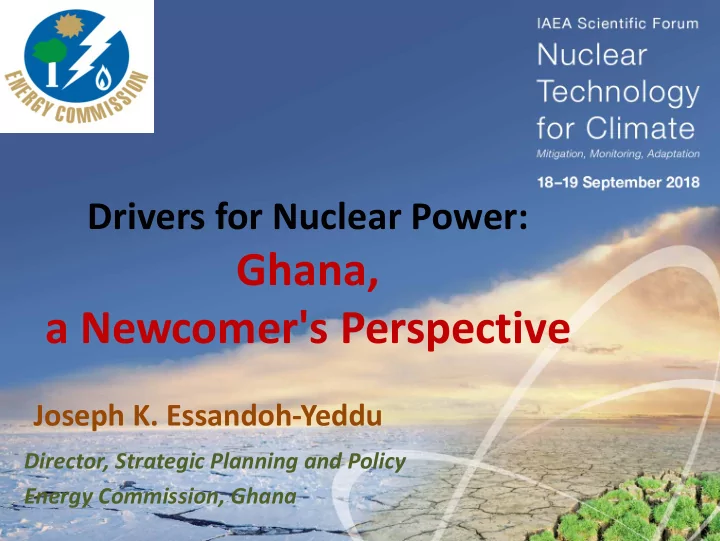

Drivers for Nuclear Power: Ghana, a Newcomer's Perspective Joseph K. Essandoh-Yeddu Director, Strategic Planning and Policy Energy Commission, Ghana
Ghana { more information available at www.ghanaweb.com} 1 Location: West Africa • Climate: Tropic-2 seasons ; • – Dry and rainy Official language: English • Population: ̴ 30 million (24.2 • million in 2010 census) Total area: 92,500 square miles/ • 237,000 square km 2017 Nominal GDP per capita • (US$,PPP): 4,750 (3 ,100 in 2010) IMF World Economic Outlook (WEO) Major primary economic • resources: Gold, cocoa, bauxite, petroleum ? Major Sport: soccer/football •
Ghana, a lower middle income now but can do better but less energy – less (non-oil) economic growth!! 2
Driver_1: Long-Term Vision 100yrs after independence (1957-2057) Lower-middle income to Upper middle / HIGH-INCOME Current - 2017/2018 Future – 2047/57 • Population: Lower Middle • Population: 50/51 million income: ~ 30 million • Upper Middle/High income • GDP/capita : ~ $1,820 GDP/capita: ~ $12,736 • Electricity consumption per • Electricity consumption per capita: ~ 420 kWh capita : ~ 10,000 kWh • Installed grid capacity: • Installed capacity: ~ 50,000 MW . ~ 4,800 MW. • Electricity Access: 100% • Electricity Access: 84% Comparable to South Korea today 3
Driver_2: Increased Electricity Demand: Ghana’s Business-as-Usual Long Term Electricity Demand q Energy is the 2 nd largest Projections though not enough for the long-term economic vision GHGs emissions (25% of total) in Ghana and it’s envisaged to increase with time as a high income economy agenda is pursued . q This pursuit would be largely driven by energy as observed on other developed Countries around the world. q The Energy employed thus must be reliable and clean for Ghana to achieve it’s commitment under the PARIS AGREEMENT whilst achieving its economic goals . 4
Potential for higher ECON growth is great LONG-TERM UPPER MIDDLE INCOME VISION REQUIRES But Massive electricity requirement HIGHER POWER DEMAND (MW) (Top-Down Approach) SECTOR 2017 2047/57 Electricity Requirement for long-term econ growth Industrial 450 19,220 Lower-middle Income TO Upper-middle or High Income Manufacturing 6,700 300,000 40,000 Base Metal 2,640 Extractives 1,000 35,000 250,000 Water & Waste 710 30,000 Transport 4,950 200,000 Other Industries 3,220 25,000 Agriculture 1 670 GWh MW 150,000 20,000 Service 413 9,470 Households 906 7,123 15,000 100,000 Export 39 3,000 10,000 Network Usage 10 30 50,000 Transmission Losses 276 980 5,000 Total (MW) 2,095 40,493 - - GWh GWh MW MW 5
Why Nuclear?: Driver 3_Limited Hydro Resources o Ghana’s Potential exploitable resource is only about 2,420 MW o 1,580 MW already developed at Akosombo, Kpong and Bui. o Resulting in a total of 65.3% of resource exploited. o Remaining 840 MW can be obtained from 21 sites mainly from medium and small Hydro power plants with capacities below 100 MW. 6
Why Nuclear? : Driver 4_Limited Gas Resource Expecting Depletion by 2040 The gas supplies from all the existing fields as projected by Ghana NOC would not be able to sustain the projected electricity and power demand; Gas supplies from most of the gas fields (except TEN) would start dwindling by 2030 [Source: GNPC –(NOC)] TEN Gas Production mmscfd Greater Jubilee Full Field Gas Production, mmscfd Aker Gas Production Forecast, mmscfd (GNPC) Sankofa and GyeNyame Gas Production mmscfd 7
Why Nuclear? : Driver 5_ Increasing Greenhouse Gas (GHG) Emissions Ghana NDCs 8
Driver 5: Energy Diversification Ensuring sustainable fuel mix for power generation Optimal Installed Capacity for High Income Scenario 50,000 45,000 Nuclear 40,000 35,000 Coal 30,000 LNG MW Potential to displace 25,000 this coal portion as Imported Gas 20,000 well to further 15,000 Domestic Gas reduce GHG emissions 10,000 Solar/Wind 5,000 Hydro 0 2018 2021 2025 2029 2033 2037 2041 2045 2047 Year 9
Why Nuclear Energy? – Summary Thank you 10
Concluding Remarks q Question 1: Nuclear is an unsafe energy source for a country like Ghana? Answer : The safety standards in the nuclear industry are unparalleled in the world. o Defence in depth principle provides very (extremely) low loss of life risk probabilities . The number of radiological deaths from even the recent Fukushima earthquake remains minimal to zero. q Question 2: We cannot manage our garbage, how can we manage a nuclear power plant? Answer : Nuclear power is the only large-scale energy-producing technology which takes o full responsibility for all its wastes and fully costs this into the project . q Question 3: If nuclear is for the long-term, why all the noise now? Answer : Competency development in nuclear power development is critical and a long o road journey. Even starting now does not guarantee a smooth road ahead. q Question 4: The industry is a hi-tech one, so only foreign personnel will operate? Answer : Yes, the industry is highly skilled, but Ghanaians can rise to the occasion. As an o example, whereas other countries use consultants for Phase 1, Ghana did most of the work locally, with support from the IAEA. For a start, we can opt for Build-Operate-and Transfer (BOT) or Build Operate and Own (BOO) and through Public-Private Partnership ( PPP) arrangement to facilitate Local Content ( Ghanaian participation) . 11
Recommend
More recommend